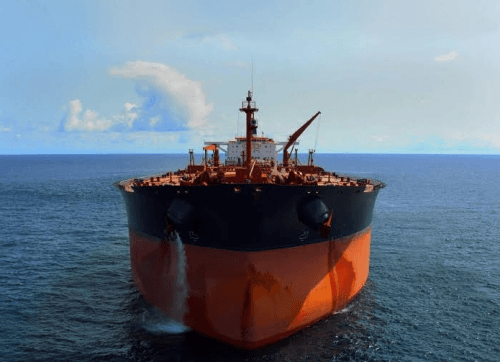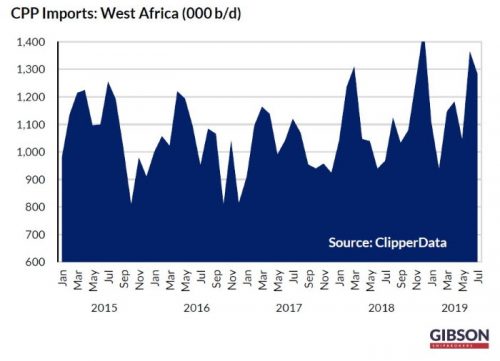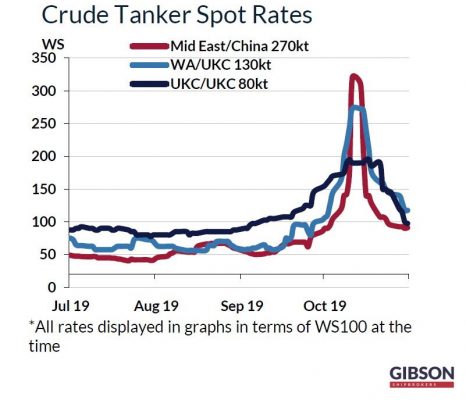The operation of the new Dangote refinery in Nigeria is bound to affect the West African tanker market. At this point, it’s only a matter of when, not if. In its latest weekly report, shipbroker Gibson said that “a few months ago it was reported that the construction of the 650,000 b/d Dangote refinery in Nigeria will not be completed until the end of 2020, a year later from the original plans due to problems importing steel and other equipment needed for the refinery. The plant, located at the Lekki Free Zone (in close proximity to Lagos), will be the largest single train refinery in the world. It will be complimented by the petrochemical and fertilizer projects, served by the refinery by-products as raw materials. According to Dangote’s chief operating officer, the refinery tank farms are scheduled for completion by the end of this year. These tanks will be connected to five single point mooring buoys (SPMs), which will enable the refinery to receive crude and pump the products back into tankers. In terms of actual production, the company executives anticipate commencing refining operations within two months of the mechanical completion of the refinery, which is in early 2021”.
According to Gibson, “despite this announcement, many independent industry analysts do not expect to see full scale commercial operations at the refinery until 2022. Building a greenfield refinery is never an easy task, building one of the largest refineries in the world in a country that is prone to instability and security risks is even more challenging. The history shows that the start dates of greenfield refineries often get delayed. As such, there is an understandable uncertainty when Dangote actually comes online”.
“However, Dangote representatives dismiss the speculation for further delays. Indeed, it is apparent that the construction is proceeding at full speed. In late July Sinopec announced that a completed atmospheric distillation tower built by the company set sail for Nigeria, with Dangote management expecting the delivery in October. Yet, while the construction and shipment of this key piece of equipment are considered a significant leap forward, there are other secondary units at the refinery, which also need to be sourced and installed”, Gibson said.
The shipbroker added that “according to Group Africa Publishing, the planned annual production of the refinery include 10.4 million tonnes of gasoline, 4.6 million tonnes of diesel and 4 million tonnes of jet fuel. As such, the plant will not only have the capability to meet Nigerian domestic petroleum consumption, but also will have surplus for exports into other West African countries and beyond. At present, over 1.1 million b/d of clean petroleum products are imported into West Africa and this trade is likely to see a major downward correction, following the start-up of full-scale operations at Dangote. The picture is similar for crude tanker demand out of West Africa. If all crude feedstock is sourced domestically, volumes exported to Europe and Asia are likely to decline”.
“However, it remains to be seen whether Dangote will be in position to supply all products into Nigeria. Retail prices are heavily subsidised and if the Nigerian government wants to maintain this practice, it is likely to face pressure to pay Dangote for the difference between local and international prices. In February 2019, Mr Dangote was quoted saying he would not sell his refined products at the government’s regulated price, stating his intention to sell internationally if need be. Nonetheless, once in operation, the refinery will transform the energy landscape in West Africa and regional crude/product tanker trades, regardless whether Dangote’s products are sold domestically or internationally”, Gibson concluded.
Source: Hellenic Shipping News
Copyright Ships & Ports Ltd. Permission to use quotations from this article is granted subject to appropriate credit given to www.shipsandports.com.ng as the source.


